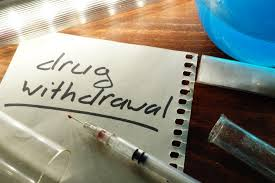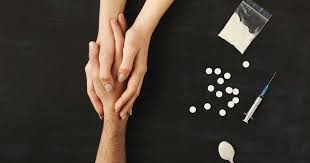Drug Addiction Symptoms & Withdrawal
Immediate
Placement Available at our Top-Rated Treatment Centers.
Please call us at (855) 410-4488. We work
with most major insurance providers and offer flexible payment
options!
Atrium Addiction Care offers a variety of treatment choices and programs for individuals struggling with drug or alcohol addiction. Our inpatient treatment programs are designed for those who have more severe substance use problems and require 24-hour care. We admit both voluntary and involuntary patients.

Drug addiction is a serious and complex issue that affects millions of people worldwide. It is characterized by compulsive drug seeking, even in the face of negative and adverse consequences afterwards, and can lead to significant physical and psychological harm. Those struggling with drug addiction often experience a range of symptoms that reflect changes in their brain chemistry as well as the impact on their daily functioning.
one common aspect of drug addiction is withdrawal, which occurs when an individual stops using drugs or significantly reduces their use. Withdrawal can be painful and uncomfortable, but it is an essential step towards recovery from addiction.
Understanding the signs and symptoms of both opioid addiction and withdrawal is crucial for anyone looking to overcome substance abuse issues. In this article, we will explore some of the most common drug addiction symptoms and withdrawal experiences in order to provide helpful information for those seeking treatment at Atrium Addiction Care.
Understanding The Nature Of Addiction
Drug addiction is a complex and chronic disease that affects millions of people worldwide. It is characterized by compulsive drug-seeking behavior despite harmful consequences, such as physical and psychological dependence on the substance.
Substance abuse often leads to withdrawal symptoms when one tries to quit or reduce the amount consumed. These symptoms can be severe and may include nausea, insomnia, anxiety, depression, irritability, and cravings for the drug.
To better understand the nature of addiction, it's crucial to recognize that it's not just about willpower or moral weakness. Addiction changes brain structure and function over time, making it difficult for individuals to control their impulses and resist temptation. This change in brain chemistry also explains why quitting drugs can be so challenging even if an individual is motivated to do so.
Mental health professionals play a critical role in diagnosing and treating drug addiction. They use evidence-based therapies like cognitive-behavioral therapy (CBT) or motivational interviewing to help patients overcome addiction. By addressing underlying issues such as trauma or mental health disorders that contribute to substance abuse, these therapies aim at helping individuals achieve long-term recovery from drug addiction.
Recognizing The Signs Of Drug Dependency
Drug addiction is a chronic and complex disease that affects the brain's reward, motivation, and memory functions. It can cause physical, emotional, social, and financial problems for individuals and their families. Knowing the signs of drug abuse may help in identifying those who need support or treatment.
One of the main symptoms of drug addiction is withdrawal. When someone stops using drugs after becoming dependent on them, they may experience several unpleasant physiological and psychological symptoms such as anxiety, depression, nausea, vomiting, muscle pain, insomnia, sweating, tremors, seizures, etc. Withdrawal symptoms vary depending on the type of substance used; however, they are generally intense enough to make people crave more drugs to avoid discomfort.
Physical signs are another indication of drug abuse. These include dilated or constricted pupils (depending on the drug), bloodshot eyes or dark circles under the eyes due to lack of sleep or poor nutrition habits related to drug use. Other common physical indicators are weight loss or gain without apparent reason due to changes in appetite caused by certain drugs'' effects on metabolism. Skin marks from injecting substances into veins (track marks) can also be evident among intravenous users.
Behavioral signs of drug dependency include secretive behavior around family members and friends about one's whereabouts or activities related to drugs usage. They might start neglecting personal hygiene habits like showering regularly because taking care of themselves no longer becomes a priority compared with getting high from drugs.Symptoms Of Withdrawal
Having discussed the physical signs and symptoms of drug addiction in the previous section, it is pertinent to note that withdrawal from drugs can be a life threatening and harrowing experience for individuals who have developed a dependency on these substances.
Withdrawal symptoms vary depending on factors such as the type of drug used, duration of use, dose, and individual differences. However, some common withdrawal symptoms include restlessness, anxiety, depression, nausea, vomiting, sweating, chills or fever.
One important aspect to consider when discussing withdrawal symptoms is that they are not only limited to physiological changes but also psychological ones. Individuals undergoing withdrawal may experience intense cravings for drugs which can lead to relapse if left unaddressed.
Furthermore, those with severe addictions may suffer from more severe symptoms such as seizures or hallucinations. Therefore, it's essential to seek professional help during opioid detoxification to ensure safety and increase chances of successful recovery.
It should be noted that while experiencing withdrawal symptoms can be challenging for anyone attempting to overcome drug addiction; it does not have to be done alone. There are various resources available including medication-assisted treatment programs (MAT), counseling services and support groups like Narcotics Anonymous (NA).
It is vital that people struggling with drug addiction receive adequate care and support through all stages of their recovery process so they can rebuild their lives without having to rely on addictive substances again.
Coping Strategies For Withdrawal

Experiencing drug addiction symptoms can be an incredibly overwhelming and isolating experience. One of the most challenging aspects of addiction is going through withdrawal. Withdrawal symptoms severe alcohol withdrawal can range from mild to severe, but regardless of their intensity, they are difficult to cope with. Coping strategies for withdrawal are essential tools that individuals in addiction treatment must acquire to successfully overcome substance abuse.
The first step towards developing coping strategies for unpleasant withdrawal symptoms is understanding what triggers these symptoms. The physical and emotional effects of substance abuse disrupt the brain's chemical balance, leading to various withdrawal symptoms when a person tries to quit using drugs or alcohol. Common symptoms include nausea, vomiting, anxiety, depression, insomnia, and tremors.
Identifying these triggers will help people develop effective coping mechanisms. Once triggers have been identified, it's important to create a plan for dealing with them effectively. Here are three examples of coping strategies for withdrawal:
- Practicing mindfulness meditation
- Engaging in regular exercise or physical activity
- Seeking support from friends and family members
Coping strategies may vary depending on individual needs; thus, working closely with medical professionals during addiction treatment is crucially important.
Incorporating healthy habits into daily routines while undergoing addiction treatment can alleviate some of the discomforts associated with drug withdrawal management, addiction symptoms and withdrawal. Through constant self-reflection, patience, resilience and persistence one can gradually learn how to live life without relying on substances as a crutch.
How Atrium Addiction Care Can Help
Atrium Addiction Care offers a wide variety of evidence-based treatment programs tailored to meet the individual needs of each client. These services can include relapse prevention plans, peer support groups, and ongoing therapy sessions.
These treatment programs can include both inpatient and outpatient services, as well as individual, family, and group therapy. Atrium Addiction Care also provides aftercare support options to help clients maintain their sobriety over time.
Treatment Programs
Drug addiction is a complex disorder that affects millions of people worldwide. The symptoms of drug abuse can range from mild to severe and may include physical, emotional, and behavioral changes.
While some individuals are able to overcome their addiction on their own, many require professional support through treatment programs.
At Atrium Addiction Care, we offer various evidence-based treatment programs designed to help individuals overcome drug use and addiction. Our approach focuses on providing personalized care tailored to meet each individual's unique needs. We recognize that there is no one-size-fits-all solution when it comes to treating addiction.
Our treatment programs incorporate a combination of counseling, therapy, medication-assisted treatment (MAT), and other supportive services such as group therapy sessions.
Our team of experienced professionals works closely with clients throughout the recovery process, offering guidance and support every step of the way. With our comprehensive approach to care, we strive to empower individuals with the tools they need to achieve long-lasting recovery from drug addiction.
Aftercare Support

In addition to our evidence-based treatment programs, Atrium Addiction Care also provides aftercare support for individuals who have completed their initial treatment. Aftercare support is an essential component of recovery as it assists clients in maintaining sobriety and preventing relapse.
After completing a treatment program, individuals may experience withdrawal symptoms or face challenges in returning to their daily lives. Our aftercare support services aim to address these potential issues by providing continued care and resources that can help mitigate the risk of relapse.
Our aftercare support services include ongoing counseling, therapy sessions, peer support groups, and access to mental health professionals. These resources are designed to provide additional guidance and assistance as individuals adjust back into their everyday routines while managing their addiction.
Personalized Care And Support For Recovery
Personalized treatment plans are an important component of recovery from drug addiction, as they provide a roadmap for the individual to follow in order to achieve their desired goals. Holistic healing approaches have also been shown to be beneficial for individuals in recovery, as they address both physical and psychological aspects of the condition.
Peer support groups are also an essential part of recovery, as they provide social and emotional support to individuals who may feel isolated or overwhelmed. Additionally, peer support groups offer a sense of connection and understanding that is not available through traditional medical care.
Research suggests that these three elements, when combined, create an effective and comprehensive recovery plan. Finally, these approaches should be tailored to the individual’s needs in order to maximize success and ensure long-term recovery.
Personalized Treatment Plans
Drug addiction opioid dependence can be a debilitating condition that affects not only the individual but also their loved ones. The symptoms of drug abuse and withdrawal can range from mild to severe and may vary depending on several factors, including the type of substance used and duration of use.
It is essential for those struggling with drug addiction to seek personalized treatment plans that cater to their unique needs. Personalized treatment plans are designed to address an individual's specific circumstances, such as co-occurring mental health disorders or medical conditions that could complicate recovery. These plans take into consideration various aspects of a person's life, including their family history, social support system, employment status, education level, and cultural background.
By creating customized approaches to care, individuals receive tailored interventions that target their particular concerns while promoting long-term recovery. The goal of personalized treatment is to provide comprehensive care that focuses on all areas of an individual's life affected by drug addiction.
This includes addressing underlying issues like trauma or chronic pain management, implementing evidence-based therapies such as cognitive-behavioral therapy (CBT) or dialectical behavior therapy (DBT), and providing ongoing support through aftercare programs. Personalized treatment plans offer hope for those who struggle with drug addiction by providing them with the tools they need to achieve lasting sobriety and improve overall well-being.
Holistic Healing
In addition to personalized treatment plans, there is a growing trend towards holistic healing approaches for those struggling with drug addiction. Holistic healing recognizes that substance use disorders not only affect an individual's physical health but also their mental and emotional well-being.
Holistic approaches aim to address the whole person rather than just the physical symptoms of drug addiction or withdrawal. Holistic healing methods may include practices such as mindfulness meditation, yoga, acupuncture, massage therapy, and nutritional counseling.
These modalities can help individuals manage stress, reduce anxiety and depression, improve sleep quality, and enhance overall physical health. By incorporating these practices into treatment programs, individuals can experience a more comprehensive approach to care that supports their recovery on all levels.
While medication-assisted treatments (MAT) still play a critical role in addressing substance use disorders, holistic healing approaches offer additional tools to support long-term recovery. Combining evidence-based therapies like CBT or DBT with complementary modalities enables individuals to build resilience while promoting self-care and self-awareness.
Ultimately, personalized medical and psychological care, and support for recovery should consider treating each person as a unique entity that requires an individualized approach tailored specifically to them.
Peer Support Groups
Another aspect of personalized care and support for drug addiction recovery is the involvement of peer support groups. Peer support groups are composed of individuals who have gone through similar experiences with substance abuse, withdrawal, and recovery. These groups aim to provide a safe space where members can share their stories, struggles, and triumphs in their journey towards sobriety.
Peer support groups offer several benefits that complement traditional treatment approaches. First, they provide emotional support from people who understand what it's like to battle drug addiction firsthand. Second, these groups serve as a source of accountability where members can hold each other responsible for maintaining sobriety. Third, peer support groups may also help reduce feelings of isolation associated with addiction.
The Recovery Village Ridgefield offers different types of peer support groups such as 12-step meetings, SMART Recovery meetings, and Refuge Recovery meetings. The goal of these groups is to empower individuals by providing them with tools and resources needed to sustain long-term recovery successfully.
By incorporating peer support group participation into treatment programs tailored specifically to each individual's unique needs and preferences, patients receive comprehensive care designed to enhance physical health while addressing mental and emotional well-being.
Conclusion
Drug addiction is a complex and challenging problem that affects millions of people worldwide. Recognizing the signs of drug dependency and understanding the symptoms of withdrawal can be crucial in seeking help for those who struggle with addiction. Coping strategies are also essential to manage drug withdrawal, as it can be a difficult process.
Atrium Addiction Care provides personalized care and support for individuals struggling with addiction. The facility offers evidence-based treatment programs designed to meet each client's unique needs, ensuring the highest level of success in their recovery journey.
With an experienced team of professionals and comprehensive resources available, Atrium Addiction Care is committed to helping clients overcome addiction and achieve lasting wellness.
